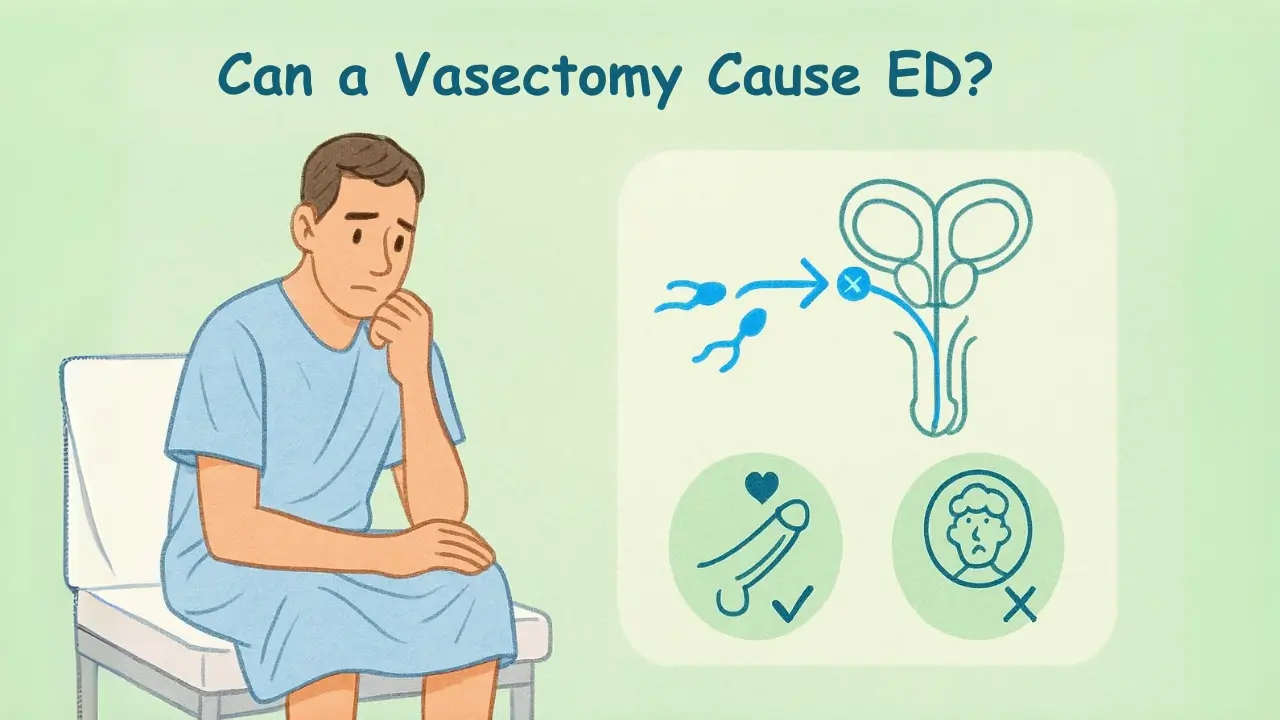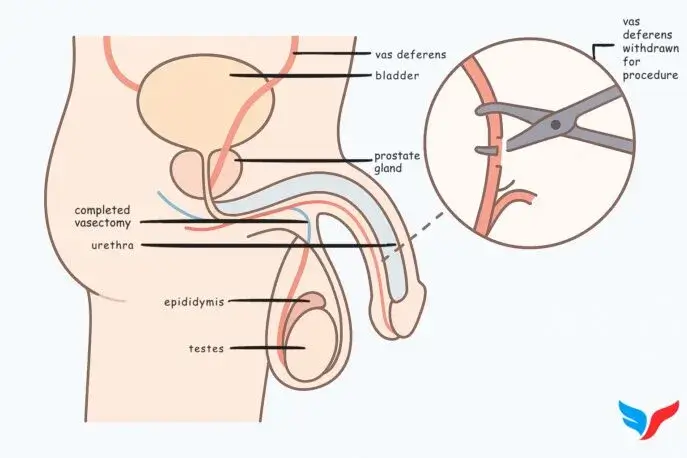- Your cart is empty
- Continue Shopping

Can a Vasectomy Cause ED?
What is Vasectomy and What Its Affects?

A vasectomy is a simple surgery that helps prevent pregnancy. During the procedure, a doctor blocks or cuts the two tubes (called the vas deferens) that carry sperm from the testicles to the urethra. This means that sperm can’t reach the semen that comes out during ejaculation. The sperm your body still makes gets absorbed naturally and doesn’t cause any harm.
The only purpose of a vasectomy is to stop sperm from getting into the semen. It doesn’t change anything else in your body. Your sex drive, ability to get an erection, and testosterone levels all stay the same. Because the surgery only affects the sperm tubes, it doesn’t mess with how your body works during sex.
According to AUA Guidelines, One important thing to remember is that a vasectomy doesn’t make you sterile right away. Sperm can still be in your system for a few weeks or even months after the surgery. That’s why you need to use other birth control methods until a doctor tests your semen and confirms there is no sperm left. This test is called a post-vasectomy semen analysis (PVSA). Talking to your doctor before the procedure helps make sure you understand how long it takes to fully work and what to expect afterward.
Why Vasectomy Doesn't Directly Cause ED
Getting and keeping an erection is a complicated process that involves many parts of the body working together. Your brain, hormones, nerves, muscles, and blood flow all play a role. When you’re sexually excited, your brain sends signals that increase blood flow to the penis, which makes it firm.
Now, it’s important to know that the part of the body affected by a vasectomy, the vas deferens, has nothing to do with how erections happen. A vasectomy only blocks the tubes that carry sperm. It doesn’t touch the nerves, blood vessels, or muscles that are needed for erections. That’s the main reason why having a vasectomy doesn’t cause ED (erectile dysfunction).
Some guys worry that a vasectomy might lower their testosterone, which is the hormone that affects sex drive and energy. But doctors say a vasectomy doesn’t affect testosterone levels. That’s because testosterone is made in a different part of the testicles than where the sperm travels. Even though a few studies have noticed tiny changes in testosterone over time, these changes are so small that they don’t matter for your health or sex life.
| Feature | Vasectomy | Erectile Function |
|---|---|---|
| Primary Target | Vas deferens (tubes carrying sperm) | Penis (blood vessels, nerves, muscles, tissues) |
| Purpose/Outcome | Prevents sperm from entering ejaculate | Enables penile rigidity for sexual intercourse |
| Involved Systems | Male reproductive system (sperm transport) | Nervous system, circulatory system (blood vessels), endocrine system (hormones), muscular system |
| Hormonal Impact | No direct impact on testosterone production | Dependent on adequate testosterone levels for libido and overall function |
| Direct Connection | None to the mechanisms of erection | N/A |
What Medical Research Says?
Doctors and scientists have studied whether getting a vasectomy affects a man’s ability to get or keep an erection. The clear answer from medical research is: No, a vasectomy does not cause erectile dysfunction (ED). In fact, some men feel their sex life gets better after the procedure. Here’s what the research shows:
- No Harm to Sexual Function (May Even Help): A big review in 2020 looked at many studies and found that most men had no problems with their sex life after a vasectomy. Some even said their erections, orgasms, and overall sexual satisfaction got better. Experts think this might be because men feel less stressed about accidental pregnancy. Some men also said they felt more confident and relaxed during sex, which helped their relationships too.
- Same ED Rates as Other Men: A large study in Australia looked at over 3,000 men and found that men with vasectomies didn’t have more problems with erections than men without vasectomies. Vasectomized men were only marginally more likely to report difficulty maintaining an erection (10.8% vs 8.2% in non-vasectomized men), and this small difference disappeared after controlling for age and other factors. Any small difference in numbers went away once they considered other things like age. Overall, both groups were equally happy with their sex lives. In fact, more men with vasectomies said they were very happy in their relationships.
- May Even Lower ED Risk: Some research suggests that men who have had a vasectomy might actually have a lower chance of getting ED. In one study, nearly 38% of men said their sex lives got better after the procedure. They described it as more fun and less stressful. Another recent study used a standard test called the IIEF and found that men who had vasectomies had fewer erection problems and were more satisfied with sex than men who didn’t. This may be because they no longer worry about getting their partner pregnant.
- Mental, Not Physical, Causes of ED: If some men do get ED after a vasectomy, it’s usually not because of the surgery itself. One study showed that these cases were caused by stress, worry, or relationship problems. For example, some men felt unsure about getting the vasectomy or were pressured into it by their partner. These emotional issues made them more likely to experience ED. When doctors checked these men, they found nothing physically wrong. This shows that ED after vasectomy is mostly about how a person feels, not a medical problem caused by the procedure.
Vasectomy does not damage your body’s ability to get an erection. If ED happens afterward, it’s usually due to emotional stress or relationship concerns, not the surgery itself.
Expert Opinions: Can a Vasectomy Cause ED?
Doctors and health experts agree: getting a vasectomy does not cause problems with erections or sexual performance. Here’s what top medical sources say:
- Mayo Clinic: The Mayo Clinic says clearly that a vasectomy doesn’t hurt your sex drive, erections, or manhood. It just stops you from making someone pregnant. In fact, some men feel more satisfied with sex after they recover. The surgery only blocks the tubes that carry sperm and doesn’t touch the parts of the body that help with erections or desire.
- Cleveland Clinic: Experts at the Cleveland Clinic say that a vasectomy won’t change your sex drive or ability to get an erection. They explain that your erections and orgasms will feel the same afterward. The only difference is your semen won’t have sperm in it. Everything else stays normal.
- Healthline: A trusted health website, Healthline, says that it’s very rare for a vasectomy to cause erectile dysfunction (ED). If it happens, it’s usually because of stress or worry, not the surgery itself. Healthline explains that the vasectomy doesn’t affect the penis or the blood flow and nerves needed for erections. Most problems after a vasectomy are mental, like anxiety, not physical damage.
- NIH and Urology Groups: The U.S. government’s health experts say a vasectomy won’t hurt your sex life. It doesn’t lower testosterone (the hormone that affects desire), and it won’t stop you from getting erections or ejaculating. Only sperm is removed from the semen. Other expert groups agree that a vasectomy done correctly shouldn’t change your sexual health. Doctors do suggest talking about any worries before the procedure. Once fears are gone, many men feel even better and more relaxed during sex.
Experts all agree, a vasectomy doesn’t mess with your ability to have or enjoy sex.
Patient Experiences on Vasectomy
Doctors say that a vasectomy doesn’t cause erection problems (ED), but it’s still helpful to listen to real stories from people who had the procedure. Many men and their partners share their experiences online, and while some are very positive, others talk about stress or worries. Here are some common things people talk about:
- Worries Before Surgery: Some men feel nervous before getting a vasectomy because they fear it might affect their sex life. This is one of the biggest reasons some avoid the procedure. Even when doctors explain it won’t hurt sexual function, the fear can still be strong. That fear can cause stress and make someone feel less confident. But the truth is, a vasectomy doesn’t change things like testosterone, sex drive, or erection ability.
- Talking in Online Groups: Many men use forums like Reddit to talk about their recovery and feelings after a vasectomy. A study from 2024 looked at over 1,000 posts and found people often talked about pain, semen changes, and ED worries. Some men were confused or scared when their recovery didn’t go exactly as their doctor said. These forums help guys support each other and feel less alone. ED wasn’t the main issue discussed, but it came up sometimes with pain or stress after the surgery.
- ED Caused by Pain or Complications: A small number of men do have problems after a vasectomy. One man said he had long-term pain in his testicles years after the surgery, which made sex uncomfortable and sometimes caused ED. Pain like this doesn’t mean the body can’t have erections, but it makes it harder because it’s distracting. These kinds of side effects are rare, but they do happen. Some men said they wish they knew more about these risks ahead of time.
- Feeling Different After Sex: A few men said that sex felt different after their vasectomy, even though they didn’t have ED. Some said orgasms weren’t as strong or that their semen didn’t come out the same way. One person on a forum said he hadn’t had a “good orgasm” in years and was upset his doctor blamed it on stress. Another said he hoped blood tests would show a problem so he could get help. While these stories show real frustration, doctors say these changes are usually not from the surgery itself. Sometimes they come from other health issues or emotional stress, and it’s a good idea to get checked just in case.
In short, medical studies say vasectomy doesn’t cause ED. Most men do just fine afterward and some even enjoy sex more since they don’t worry about pregnancy. Still, fear and stress can affect sexual performance, and rare problems like long-term pain can make things harder.
CONTACT US
If you have any question, please contact us at
Near Maxus Mall, Mira-Bhayander.
Thane-Mumbai – 401101
At FableWings, we work hard to make sure the health and wellness products we sell online follow all the rules and laws. Every product on fablewings.com comes from trusted companies that are allowed to make medicine and have trained experts checking the quality. Our goal is to give you safe, helpful products you can trust. Read more in our Disclaimer.

